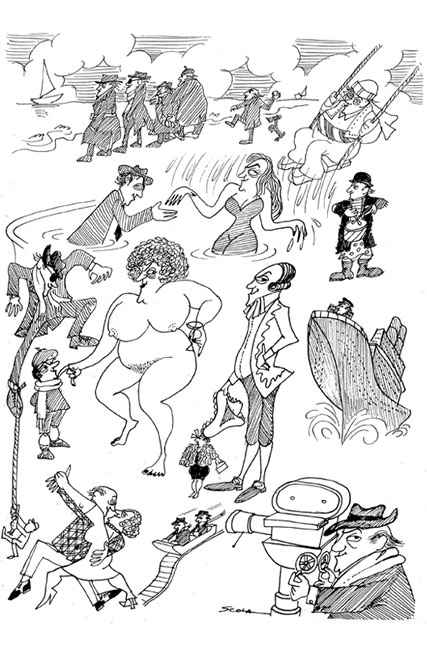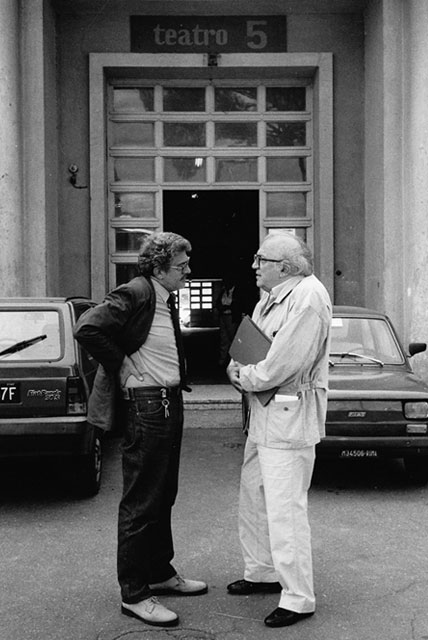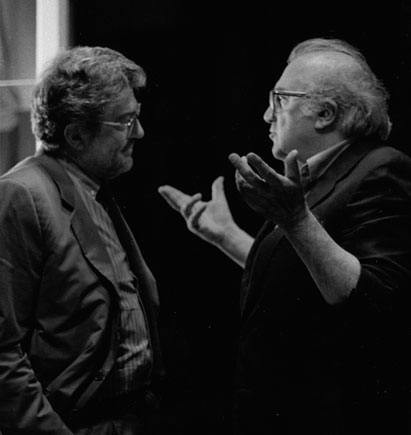“I made nearly all of it up: a childhood, a personality, dreams, memories…
for the pleasure of telling others about them.”
Federico Fellini |
 “Fellineide”, drawing by Ettore Scola
“Fellineide”, drawing by Ettore Scola |
To Fellini, twenty years after…
“I’ve had an easy life with kind friends who have let me jealously cultivate my creativity. It’s as if they had let me forever stay in my childhood playroom …Yes, my life has been fantastic, the life of an artist.”
These were Federico Fellini’s words. Federico Fellini the director from Romagna who stayed true to his origins. Fellini, the great dreamer, who was unable to be faithful to his Giulietta, but remained tied to her by a devoted, innocent love.
Cinema Italian Style 2013 dedicates its yearly appointment in Los Angeles to master director Federico Fellini, his inventions, his groundbreaking creativity, and his adventurous journey behind the camera and beyond. This year, on the 20th anniversary of his death and fifty years after the release of 8 ½, we honor Fellini and his achievements. We recall that night on the stage of the Oscars® when Fellini thanked Hollywood and the Academy. He read in broken English a speech he had written on a small piece of paper to avoid making any mistakes. He concluded with an unforgettable appeal to his wife: “And now, please, Giulietta, stop crying!”
The year was 1993, and Fellini left us forever a few months afterwards. His wife, Giullietta Masina, cried in pain and followed suit just five months later. As is the case in any special relationship, one heart could not bear the absence of the other.
Stop crying, Giulietta… let’s all stop mourning the loss of this genius. Fellini still defines Italian cinema. He is the international dream of Italian filmmaking that continues to be exported to cinema around the globe.
Fellini is 8½ and Rome, he is La Strada and The White Sheik; he is Amarcord and La Dolce Vita. Fellini is the encounter with Marcello Mastroianni and then with Roberto Benigni. He is the immortal charm of an icon like Anita Ekberg; he is the collaboration with Dante Ferretti, Nino Rota and later with Nicola Piovani. He is the friendship with Ettore Scola, author of the film in his honor, How Strange to Be Named Federico, and of the portrait of Fellini wearing a hat and a red scarf, once again used as the image of our festival. Fellini is the mystery found in The Book of Dreams. He is Rimini and Rome.
Finally, he is “his” Theater 5, obviously at Cinecittà.
On the 22nd of November, a special concert by Orchestra Italiana del Cinema will celebrate Federico Fellini at Royce Hall - UCLA (8.00 pm). In collaboration with the best LA young music talents. An unforgettable multimedia concert, with poignant video segments, celebrating the partnership between music and film.
On the 23th of November, a special evening will be dedicated to Federico Fellini at the Aero
Theatre, with the screenings of his masterpiece La dolce vita and How strange to be named Federico by Ettore Scola. |
|
GOOD THING WE HAVE FELLINI
by Ettore Scola*
Over the past few months (someone in a worse mood might say: over the past few years), we Italians haven’t had very many reasons to be satisfied with the privilege of being born in this country. That in itself isn’t so bad, considering that more often than not, national pride is confused and misunderstood with patriotism, parochialism and other dangerous stupidities.
There is one feeling, rarer and yes, nobler, which deals with the intimate pleasure of finding yourself part of a community that recognizes its common roots, common memories and common sense of collectiveness.
That feeling, to name one, that when a newspaper places the crowning of Clinton in Washington and the execution of a paraplegic in New York on the same level, makes you think with a civilized satisfaction that in Italy, where people steal, cheat and kill as well, we don’t have the death penalty: despite certain men from bad politics who occasionally, taking advantage of the pain and disdain resulting from heinous crimes, propose it once again. And despite certain polls, who knows how they are conducted, that claim a large number of Italians are in favour of reintroducing the death penalty in our laws.
Apart from the consolation from comparing ourselves to the backwardness of other countries or from some sport victory, that sentiment of collective pride can also manifest itself through events, just as rare, which are neither social nor agonistic but cultural: such as international recognition of one of our artists.
Medals, we know, prove nothing. Like ribbons on a general’s chest do not prove his ingenuousness in strategy, as a Nobel Prize, an Oscar or a prize at the Cherry Festival in Palombara Sabina has never made the celebrated work better. If it was mediocre, it remains mediocre and no appreciation can change its quality. It can only promote its notoriety.
|

|
|

|
Different it is and different must be the consideration when a work of art or artist is recognised. It is and remains great even without awards it receives or could receive.
That is the case of Federico Fellini, the only director in the history of cinema that has received four Oscars for best foreign film and one Oscar – just awarded – for lifetime achievement: five Oscars that continued to increase his international fame, but not his stature of writer. They also have another unique aspect, established another award: these awards as director of 8 1/2 are indisputable, shared, almost as if everyone makes them their own. The day the fifth Oscar was announced, at the taxi station in piazza del Popolo, a group of drivers got out of their cars and surrounded Fellini as he walked by. They didn’t say “You’re the best”. They said “We’re the best” and they went on congratulating each other.
That famished desire for national dignity – so humiliated by corrupt politicians and civil servants, tax evaders, the Mafia, irresponsible institutions, guileful and dishonest actions, television shows with vulgarities and others with violent behaviour – Fellini’s Oscar miraculously becomes an award for the entire community, like a tiny compensation for millions of good Italians, honest politicians, civil servants, professors, artisans, taxi drivers, all those who don’t receive awards but have to suffer all the injustice accumulating every day like a dark cloud over their nation. *Article written on the occasion of the Special Oscar assignment to Federico Fellini, honoring his body of work, in 1993
|
|